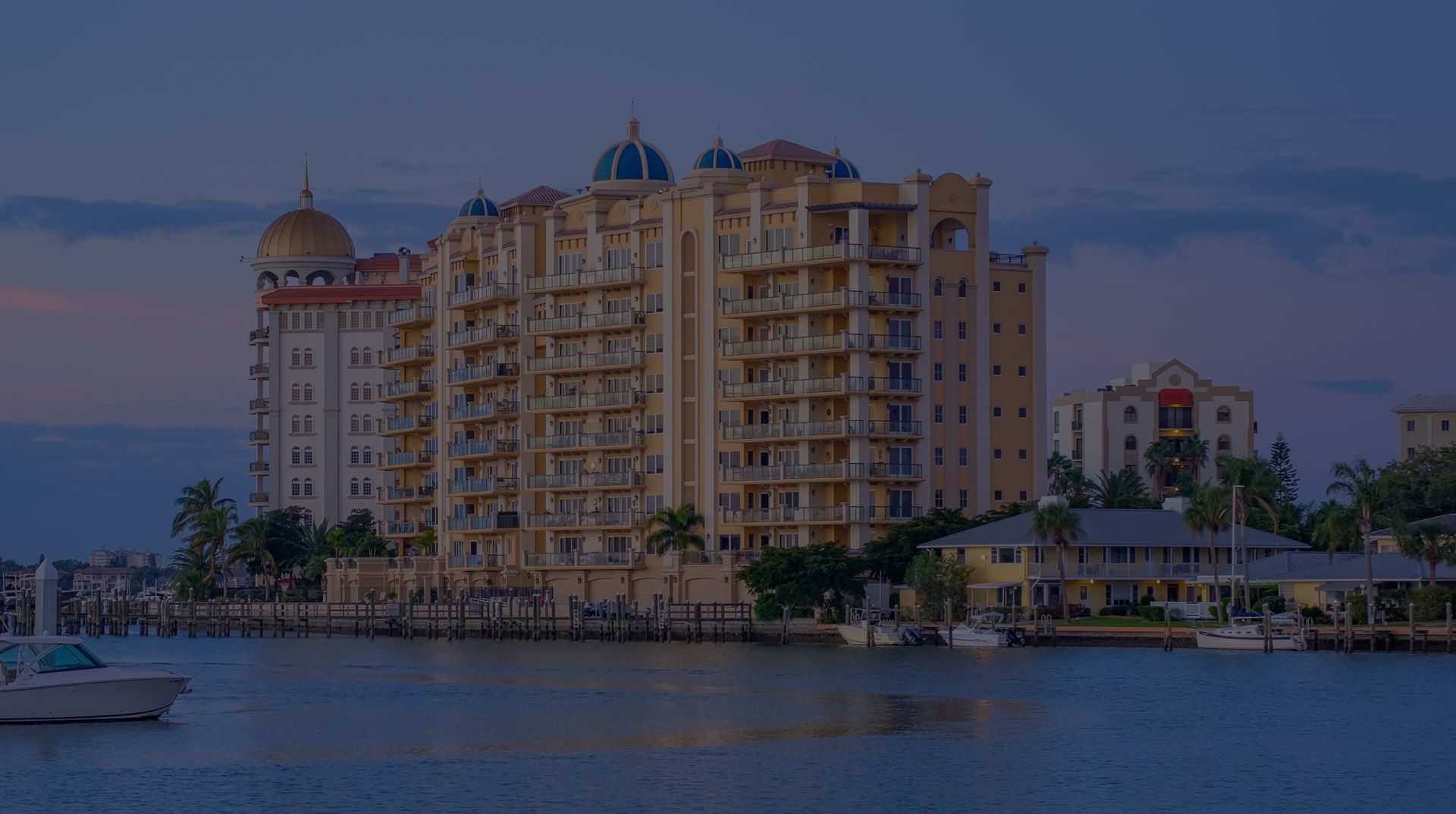View Loan Assumptions
Rates subject to change without notice
Conforming Loan amounts up to $766,550 | FHA Loan Limits are specific to each Florida County
Check to See Florida FHA loan limits here
St. George Island Condo Mortgages
Fidelity Home Group offers mortgages for warrantable, non-warrantable and condotel property types. Warrantable condos are one that a homebuyer can finance using a conventional mortgage, after having been approved under a set of guidelines set by government-sponsored enterprises Fannie Mae and Freddie Mac. Our Mortgage Experts can check to see if your condo development is currently available for a conventional mortgage.
Condominiums are defined differently than Single Family Homes
Condominiums are a single, individually-owned housing unit in a multi-unit building. The condominium owner holds sole title to the unit, but owns land and common property (elevators, halls, roof, stairs, etc.) jointly with other unit owners, and shares the upkeep expenses on the common-property with them. Unit owner pays property taxes only on his or her unit, and may mortgage, rent, or sell it just like any other personal property.
A Coop/Co-op, which is also known as a cooperative share (or cooperative housing), is a multi-family housing complex that is owned by a corporation. Learn more about our Coop/Co-op mortgage financing.
Condo mortgages come with slightly higher rates than single-family homes
- This is because lenders view condos as slightly riskier investments due to them being run by an HOA association or condo management company
- The lender must review the fiscal and physical health of the development
Some condos are “Warrantable” and some are “Non-Warrantable”
- Typically, a condo is considered “warrantable” if no single entity owns more than 10% of the units in a project, at least 51% of the units are owner-occupied, fewer than 15% of the units are in arrears (behind) with their association dues, the homeowners association (HOA) is not named in any lawsuits, and commercial space accounts for 25 percent or less of the total building square footage.
*as defined by Fannie Mae and Freddie Mac (the two Government Sponsored Enterprises who purchase and sell mortgages on the secondary market)
- A condo or co-op unit is considered “Non-Warrantable” if the project has yet to be completed, its developer has not turned over control of the HOA to the owners, the community allows short-term rentals, a single person or entity owns more than 10% of all unit, or it’s in a project where the majority of units are rented to non-owners.
*A high number of vacancies can also negatively affect the condo’s status
- Common non-warrantable properties include condotels, time shares, fractional ownership properties, and other projects which require owners to join an organization, such as a golf club.
- Manufactured housing projects and other developments which are not legally considered real estate are also excluded from warrantability. These include house boat and motorhome projects.
When buying a condo, ask your real estate agent to inquire about the building’s warrantability before you go any further.
Fannie Mae Updated Condominium Lending Guidelines
On January 1, 2022, the updated Fannie Mae condominium lending guidelines went into effect. Fannie Mae Lender Letter (LL-2021-14) specifically states that new guidelines are necessary to combat aging infrastructure and significant deferred maintenance in condominiums in the wake of the tragic collapse of the Champlain South Tower in Surfside, Florida. The new condominium requirements, as outlined below, will apply to all loans in attached condominiums with 5 or more units. Specifically, condominium associations must be aware of the following changes:
Significant Deferred Maintenance and Unsafe Conditions in Condos
Loans secured by units in a condominium with significant deferred maintenance or that have received a directive from a regulatory authority or inspection agency to make repairs due to unsafe conditions will no longer be eligible for purchase by Fannie Mae. Significant deferred maintenance is defined as any one of the following:
- Full or partial evacuation of the condominium or co-op to complete repairs is required for more than seven days or an unknown period of time.
- The condominium or co-op has deficiencies, defects, substantial damage, or deferred maintenance that is one of the following:
- Severe enough to affect the safety, soundness, structural integrity, or habitability of the improvements.
- The improvements need substantial repairs and rehabilitation, including many major components.
- Impedes the safe and sound functioning of one or more of the condominium or co-op’s major structural or mechanical elements, including but not limited to the foundation, roof, load bearing structures, electrical system, HVAC, or plumbing.
In order to determine whether significant deferred maintenance exists, Fannie Mae has indicated that its best practice for lenders is to review the past six months of a condominium association’s meeting minutes and obtain information about any maintenance or construction that may have significant safety, soundness, structural integrity, or habitability impacts on the unit or the project. References to items such as improvements, renovations, inadequate reserve funding, budget deficits, and negative cash-flows should be researched to determine if these items are related to deferred maintenance or other conditions that impact the safety, soundness, structural integrity, or habitability. Fannie Mae has also recommended that lenders review any available inspection, engineering, or other certification reports completed within the past five years to identify deferred maintenance that may need to be addressed.
Special Assessments in Condos May Impact Fannie Mae Loan Eligibility
Fannie Mae will now require all condo lenders to determine whether the condominium association has imposed any special assessments. The lender must document the loan file with the following:
- The reason for the special assessment.
- The total amount assessed and repayment terms.
- Documentation to support no negative impact to the financial stability, viability, condition, and marketability of the project.
- Confirmation that the borrower will still quality for the loan with any outstanding special assessment payment.
If the special assessment is related to safety, soundness, structural integrity, or habitability, all related repairs must be fully completed, or the project is not eligible. Additionally, if the lender or appraiser is unable to determine that there is no adverse impact, the project is ineligible.
Conditions in Condos that will not Impact Fannie Mae Lending
In Fannie Mae Lender Letter (LL-2021-14), Fannie Mae clarified that not every defect in a condominium will prevent a potential purchaser from obtaining a loan. Specifically, the following types of issues will not make a condominium project ineligible:
- Routine maintenance or repairs that a homeowners’ association (HOA) undertakes to maintain or preserve the integrity and condition of its property.
- Damage or deferred maintenance that is isolated to one or a few units that does not affect the overall safety, soundness, structural integrity, or habitability of the improvements.
Freddie Mac Updated Condominium Lending Guidelines
On December 15, 2021, Freddie Mac issued Bulletin 2021-38: Temporary Condominium and Cooperative Project Requirements and Topic 5600 Reorganization – CRC – Single Family – Freddie Mac. The requirements contained in Bulletin 2021-31 will become effective on February 28, 2022. Similar to the Fannie Mae Bulletin, Bulletin 2021-31 states that the purposes of tightening the lending requirements is due to increased risk after the Champlain Towers South collapse in Surfside, Florida. The Freddie Mac requirements apply to all condominium loans in in projects with five or more attached units.
Condominium Projects in Need of Critical Repairs are Ineligible for Loans
Bulletin 2021-38 is similar to the Fannie Mae lending guidelines, but speaks in terms of not lending in condominiums that have “significant critical repairs”, which are defined as follows:
Repairs and replacements that significantly impact the safety, soundness, structural integrity or habitability of the project’s building(s) and/or that impact unit values, financial viability or marketability of the project. These repairs and replacements include:
- All life safety hazards
- Violations of any federal, State or local law, ordinance or code relating to zoning, subdivision and use, building, housing accessibility, health matters or fire safety
- Material Deficiencies
- Significant Deferred Maintenance
Freddie Mac has indicated the following forms of documentation are acceptable in determining that a condominium does not have any significant critical repairs:
- Homeowners association (HOA) or cooperative board meeting minutes
- Engineer’s reports
- Reserve studies
- List of necessary repairs provided by the HOA, Cooperative Corporation or management company, and
- Other substantially similar documentation
Special Assessments in Condos May Impact Freddie Mac Loan Eligibility
Similar to Fannie Mae, Freddie Mac will now require all condo lenders to determine whether the condominium association has imposed any special assessments. The lender must review the following with respect to each special assessment:
- The reason for the special assessment
- The total amount assessed
- For current special assessments, the total amount is an appropriate allocation or, for planned special assessments, there is adequate cash flow to fund the reason for the special assessment, and
- For current special assessments, the amount budgeted to be collected year-to-date has been collected


